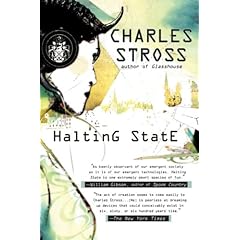Here’s a recap of the full nominee list:
- World War Z, Max Brooks
- Pattern Recognition, William Gibson
- Halting State, Charles Stross
- The Invention of Hugo Cabret, Brian Selznick
- I Am America (And So Can You!), Stephen Colbert
- Harry Potter and the Deathly Hallows, J.K. Rowling
Each of these is worth a read. I was tempted to give the award to Harry Potter, if only for the massive societal upheaval and hoopla that the book’s release caused. I have never before stood in line to buy a book at midnight, and expect that I never will again. Pattern Recognition, while not a new release, connected with me on a fundamental level. I relate to the characters and the lifestyles they lead more than any other book I can remember reading. World War Z is pure fun, with fictional interviews of survivors of the first great zombie war. Alternately horrifying and thought provoking. The Invention of Hugo Cabret swapped back and forth between traditional text and large page blocks of gorgeous illustrations telling some segments of the story. The end result is a book that reads surprisingly fast for 544 pages, and inspired me to do some research into the history of film when I finished. I Am America made the list simply because Stephen Colbert makes me laugh so much. But, in the end one book just blew my mind:
Halting State, by Charles Stross

Set in a near future Scotland, the novel opens with a bank robbery inside an online game, and from there eventually spins into high level international intrigue and espionage. The entire book is written in the second person (“You enter the room…”, etc.), which while jarring at first is ultimately a perfect choice for a book so focused on gaming and its impact on our culture. All plot aside, Stross’ world building is extremely thought provoking. ‘Overlays’ on goggles provide constant streams of data to anybody who wants it, gaming is seamless with everyday life, pseudo-VR interfaces are ubiquitous, etc.
Halting State even manages to pull off a standard Big Dumb Action Movie cliche plot element, and make it seem semi-realistic and plausible. I won’t go into specifics for the sake of avoiding spoilers, but I was more than able to suspend my disbelief around it.
If you are at all interested in how gaming will develop in the next few years, and the effect that might have on our culture, read this book.

